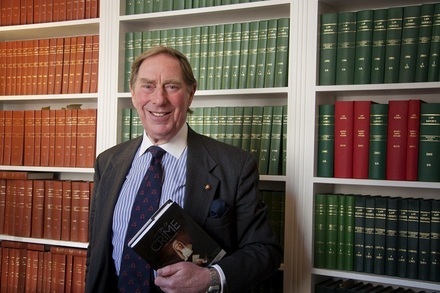Let me nail my colours clearly to the mast: I would prefer to eat my own spleen, or listen to a Gordon Brown speech, than read the memoirs of a barrister/politician. The remaindered lists are groaning under these unsellable, unreadable, dusty monuments to over-inflated egos. They should be pulped and moulded into bed pans.
However, Ivan Lawrence’s splendid book, My Life of Crime — out in paperback later this month — is very much the exception. Ivan, a distinguished QC and formerly a high-profile MP, lives life to the full and this book is brimful of classy anecdotes and well worth the read.
Ivan and I have been friends for nearly 30 years, and this book tells me things about him I never knew. For instance, when he was a young national serviceman in Malta, he managed to prevent British ships in the Mediterranean sinking a part of the US Eighth Fleet, which had sent submarines to thwart Anthony Eden’s disastrous Suez campaign. And that he was close to his cousin, Alma Cogan, a singer of the 1950s who was as revered then as Madonna is today.
He started his pupillage (apprenticeship) at the Bar with a fellow called James Burge, a great mate of John Mortimer, who based the character of Horace Rumpole on him. Lawrence’s subsequent years as a criminal barrister are fascinating. He recalls mad judges such as ‘pontoon Jack’, so named because, whatever the offence and whatever the mitigation, he would always sentence defendants to 21 months imprisonment.
Another names that crops up is Ashe Lincoln QC, a decorated Royal Naval captain during the war, who was arrested for slipping a revolver in his overcoat pocket at the Savoy. He needed to. Lincoln was a prominent Jew who needed all the protection he could get. It was the casual anti-Semitism of the age that I found most chilling. When Lawrence applied for a tenancy in a set of chambers, he was told that this was impossible as, ‘they already had one Jew already’.
I haven’t the space to note all the high-profile cases Lawrence has appeared in, but two of my favourite stories involve Ronnie Kray and Denis Nilson.
In the middle of a serious trial involving Ronnie, it was thought that it would be a good idea to get some idea of what the defence was. ‘Not tonight. I’ve got a nice young boy coming to see me,’ pleaded Ron. (Like Lawrence, Kray was a supporter of the death penalty. He thought that it was a deterrent.)
And Nilson — who murdered rent boys, boiled them and deposited what was left of them in the drains — is described making the weird observation ‘nobody wants to believe that I am just an ordinary man.’
There is also a great story in which the Red Tops will be very interested. Lawrence once defended for domestic burglary a man who felt he had been betrayed by the police after being offered immunity for returning the stolen property. And what were these valuable goods? Love letters to the householder from Princess Margaret. The householder was a woman.
Although Ivan Lawrence was a renowned hanger and flogger, and some might say he was on the medieval wing of the Tory Party, he is deeply committed to human rights, espousing the causes of Soviet Jewry. After a trip he took to the Maldives, and the publicity that resulted from it, the rule of law and the right to a fair trial were restored, and the leader of the opposition was released from prison and elected as president. Before entering the Commons, where he was a Thatcher devotee, Lawrence was regularly instructed by a young Harriet Harman, who used to run the National Council for Civil Liberties. And he was paired with none other than Tony Benn.
For anyone one vaguely interested in the law or politics, or anyone who will enjoy a few well-told tales, this book is a must-read.






Comments